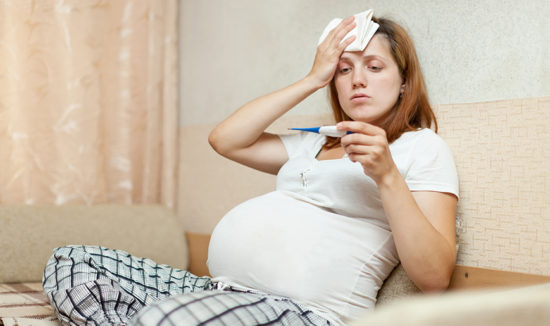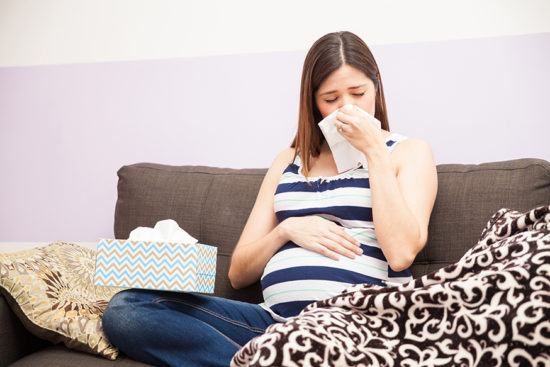Women are at greater risk of catching flu in pregnancy. Here we discuss having the flu jab or vaccine when pregnant and the potential impact of flu.

Seasonal flu occurs every year, usually in the winter. It’s a highly infectious disease caused by a virus.
The most likely viruses that will cause flu each year are identified in advance, and vaccines are then produced that closely match them.
A free flu jab is available for pregnant women and the NHS advises women to take the vaccine, whatever their stage of pregnancy.
Every year, the seasonal flu vaccine is offered to pregnant women who are at risk of flu. This includes pregnant women not in high-risk groups. There is no evidence that inactivated vaccines, such as the seasonal flu vaccine, will cause any harm to you or your unborn baby.
The seasonal flu jab recommended in pregnancy contains inactivated viruses. Usually these are grown in hens’ eggs, so if you are allergic to egg proteins, you may not be able to have certain types of the flu vaccine.
Talk to your GP if you’re unsure. It also contains other substances, such as small traces of certain antibiotics, so again, check with your GP if you have had any allergic reaction to these or previous flu shots. If you want more information, you can ask your doctor for the patient information leaflet on the flu vaccine.
When you’re pregnant, your immune system is naturally lower. This means that pregnant women are more likely to catch flu and, if they do catch it, they are more likely to develop complications. However, your immune system still functions, and the risk of complications is small.

Although most pregnant women will only have mild symptoms, women at any stage of pregnancy should be offered the flu vaccine. Serious complication of flu are very rare, but an enquiry into maternal deaths between 2009 and 2012 showed that 1 in 11 of the women who died had flu. More than half of these deaths could have been prevented by having a flu jab in pregnancy.
Talk to your GP or midwife if you’re unsure about the vaccination.
Symptoms of flu include a fever or high temperature (over 38C/100.4F) and two or more of the following:
These symptoms will be the same if you catch flu in pregnancy. Possible pregnancy flu complications are:
If in doubt about pregnancy symptoms or infections, always talk to your midwife or GP.
If you have a cold or flu there are a number of things you can do to treat the symptoms:
If you experience difficulties breathing, call your doctor.
NCT’s helpline offers practical and emotional support in all areas of pregnancy, birth and early parenthood: 0300 330 0700. We also offer antenatal courses which are a great way to find out more about birth, labour and life with a new baby.
There is information about flu on the NHS choices website.
Public Health England has produced a useful leaflet for pregnant women about the flu vaccination.